人教版七年级下册英语Unit11知识点
Unit11句型所含知识点汇总解析人教版英语七年级下册

七下Unit11一、单词k [mɪlk] n.牛奶v.挤奶2.cow [kaʊ] n.奶牛k a cow给奶牛挤奶4.horse [hɔ:s] n.马5.ride a horse 骑马feed [fi:d] v.喂养;饲养6.feed chickens 喂鸡7.quite [kwaɪt] adv.相当;完全8.anything ['eniθɪŋ] pron.任何事物;任何东西9.grow [ɡrəʊ] v.种植;生长;发育10.farm [fɑ:m] n.农场v.务农;种田11.pick [pɪk] v.采;摘12.excelent ['eksələnt] adj.极好的;优秀的二、短语1.at night 在夜晚2.a lot of=lots of 许多;大量3.e out 出来4.go on a school trip 去学校郊游5.along the way 沿线6.after that 之后7.all in all 总的来说8.take a / the train to +地点乘火车去...9.be interested in sth. 对某事感兴趣10.be interested in doing sth. 对做某事感兴趣11.not…at all 根本不……12.something/anything+adj. ...的一些事情13.too many + n.复数太多的……14.teach sb. how to do sth. 教某人怎样做某事三、重点句型1.Luckily, it didn’t, and the sun came out again.幸运的是,天没下雨,并且太阳又出来了。
2.I didn’t know they could play chess with us.我不知道他们可以和我们下象棋。
3.Then the guide taught us how to make a model robot.然后导游教我们怎样制作机器人模型。
人教版七年级下册英语Unit11单元语法知识点总结

人教版七年级下册英语Unit11单元语法知识点总结本单元重点短语的具体用法1. school trip:学校旅行。
例如:We had a great school trip to the museum.(我们去博物馆的学校旅行非常棒。
)2. go for a walk:去散步。
例如:I like to go for a walk in the park after dinner.(我喜欢晚饭后去公园散步。
)3. milk a cow:挤牛奶。
例如:Did you ever milk a cow before?(你以前挤过牛奶吗?)4. ride a horse:骑马。
例如:She enjoys riding a horse on the weekends.(她喜欢在周末骑马。
)5. feed chickens:喂鸡。
例如:My grandpa feeds chickens every morning.(我爷爷每天早上喂鸡。
)6. talk with a farmer:与农民交谈。
例如:I had a interesting talk with a farmer about farming.(我与一位农民进行了关于农业的有趣交谈。
)7. take some photos:照相。
例如:Let's take some photos to remember this moment.(让我们照些相来记住这一刻。
)8. ask some questions:问一些问题。
例如:He always asks some questions in class.(他总是在课堂上问一些问题。
)9. grow apples:种苹果。
例如:They grow apples in their orchard.(他们在果园里种苹果。
)10. show sb. around sp.:带某人逛某地。
例如:The guide showed us around the city.(导游带我们逛了这座城市。
人教版英语七年级下册单元Unit 11 知识点+测试卷+思维导图
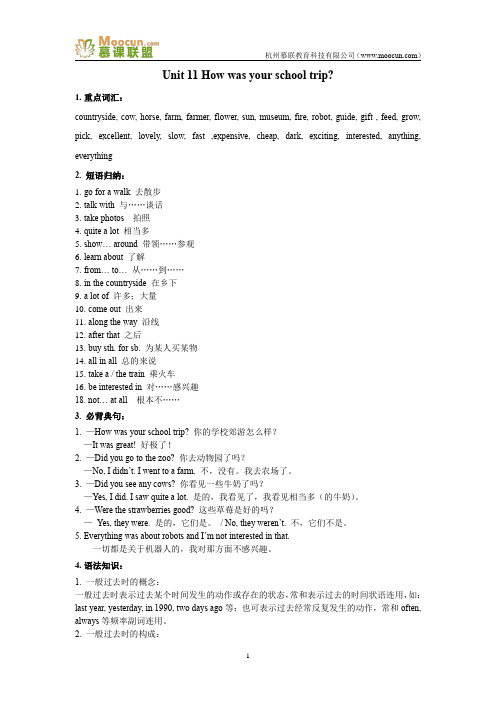
Unit 11 How was your school trip?1.重点词汇:countryside, cow, horse, farm, farmer, flower, sun, museum, fire, robot, guide, gift , feed, grow, pick, excellent, lovely, slow, fast ,expensive, cheap, dark, exciting, interested, anything, everything2. 短语归纳:1.go for a walk 去散步2.talk with 与……谈话3.take photos 拍照4.quite a lot 相当多5.show… around 带领……参观6.learn about 了解7.from… to… 从……到……8.in the countryside 在乡下9.a lot of 许多;大量e out 出来11.along the way 沿线12.after that 之后13.buy sth. for sb. 为某人买某物14.all in all 总的来说15.take a / the train 乘火车16.be interested in 对……感兴趣18. not… at all 根本不……3. 必背典句:1. —How was your school trip? 你的学校郊游怎么样?—It was great! 好极了!2. —Did you go to the zoo? 你去动物园了吗?—No, I didn’t. I went to a farm. 不,没有。
我去农场了。
3. —Did you see any cows? 你看见一些牛奶了吗?—Yes, I did. I saw quite a lot. 是的,我看见了,我看见相当多(的牛奶)。
4. —Were the strawberries good? 这些草莓是好的吗?—Yes, they were. 是的,它们是。
人教版初中英语七年级下册unit 11 过去式 知识点讲解与练习

人教版初中英语七年级下册unit 11 过去式知识点讲解与练习语法:一般过去时一、什么是一般过去时?一般过去时是用于表述“过去”的时态。
1. 表示过去发生的动作。
2. 表示过去发生的状态。
二、一般现在时与一般过去时的共同点一般过去时的句式在结构上与一般现在时的句式结构是完全相同的。
无论是陈述句还是疑问句均是如此。
因而学好了一般现在时的知识,再学习一般过去时的知识是非常容易的。
一、be动词。
1)肯定句。
I am a student. —> I was a student.You are young. —> You were young.2)否定句。
I am not a student. —> I was not a student.You are not young. —> You were not young.二、实意动词作谓语的情况。
1)肯定句。
I read books in the park. —> I read books in the park.(思考:为何看上去这个例句没有发生任何变化呢?答:因为read的过去式也为read,其拼写虽相同,但读音不同。
)He usually gets up at 7 a.m.—> He usually got up at 7 a.m.(注意:一般过去时中没有所谓的“三单变化规则”,因为一般过去时是没有人称和数的变化的)She helps me with my homework.—> She helped me with my homework.They want to ask you a question.—> They wanted to ask you a question.总结:此类结构中,将单独作谓语的实意动词变为其过去式,句子的时态即变成了一般过去时。
(实意动词单独作谓语的一般过去时没有人称和数的变化。
Unit11单元知识点归纳总结及配套练习-人教版英语七年级下册

Unit11 How was your school trip?Ⅰ. Revision(复习)Ⅱ. Presentation(重点,难点,考点,热点呈现)一般过去式1. 含义:表示动作或者状态发生在过去2.构成:肯定句:主语+动词过去式+ 其它如:I went home at nine o'clock yesterday.否定句:主语+didn't +动词原形+其它如:I didn't go home yesterday. He didn't tell me about you.疑问句:一般疑问句:Did +主语+动词原形+宾语如:Did you go home yesterday?Did you study in the school?肯定回答:Yes, I did. 否定回答:No, I didn't.特殊疑问句:特殊疑问词+did +主语+动词原型+宾语When did you finish your homework last night? What did you do the day before yesterday?3. 一般过去时态动词变化形式一般过去时态由动词的过去式表示。
大多数动词的过去式是在动词原形后加上ed构成。
这类动词称为规则动词。
1)一般情况下在词尾直接加ed。
如:play―played work―worked2)以e结尾的动词只加d. 如:like--- liked love―loved3)以辅音字母+Y结尾的动词,变Y为i,再加ed. 如:study―studied carry―carried 4)以重读闭音节结尾的动词,如果末尾只有一个辅音字母,要双写最后这个辅音字母,再加ed.如:stop―stopped5)不以ed 结尾的过去式,称为不规则动词,如:write --wrote go-went do-did have-had see-saw take-took make-made come-came buy-bought4. 标志词。
2020年人教版七年级英语下册Unit11 How was your school trip 要点详解
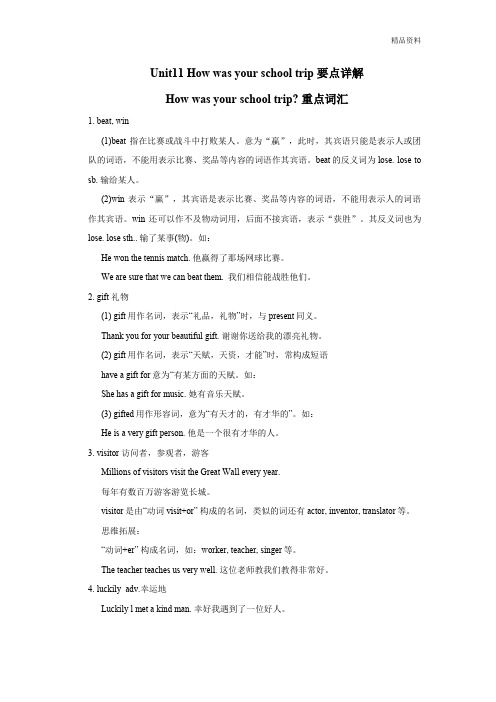
Unit11 How was your school trip 要点详解How was your school trip? 重点词汇1. beat, win(1)beat指在比赛或战斗中打败某人。
意为“蠃”,此时,其宾语只能是表示人或团队的词语,不能用表示比赛、奖品等内容的词语作其宾语。
beat的反义词为lose. lose to sb. 输给某人。
(2)win表示“赢”,其宾语是表示比赛、奖品等内容的词语,不能用表示人的词语作其宾语。
win还可以作不及物动词用,后面不接宾语,表示“获胜”。
其反义词也为lose. lose sth.. 输了某事(物)。
如:He won the tennis match. 他赢得了那场网球比赛。
We are sure that we can beat them. 我们相信能战胜他们。
2. gift 礼物(1) gift用作名词,表示“礼品,礼物”时,与present同义。
Thank you for your beautiful gift. 谢谢你送给我的漂亮礼物。
(2) gift用作名词,表示“天赋,天资,才能”时,常构成短语have a gift for意为“有某方面的天赋。
如:She has a gift for music. 她有音乐天赋。
(3) gifted用作形容词,意为“有天才的,有才华的”。
如:He is a very gift person. 他是一个很有才华的人。
3. visitor 访问者,参观者,游客Millions of visitors visit the Great Wall every year.每年有数百万游客游览长城。
visitor是由“动词visit+or”构成的名词,类似的词还有actor, inventor, translator等。
思维拓展:“动词+er”构成名词,如:worker, teacher, singer等。
The teacher teaches us very well. 这位老师教我们教得非常好。
Unit 11 单元知识点复习课件 人教版七年级英语下册

5. quite a lot 相当多;许多 ✓ quite 作副词,意为“相当;完全”。 ✓ a lot 后面不能直接跟名词,a lot of 相当于lots of,其后可接可数名词复数或不可数名词。 ✓ quite a lot意为“许多”,如果后面接名词, 则用quite a lot of。
【辨析】quite与very
walk作动词,“走路;散步”,后接地点名 词时,要加上介词to,其后接here,there,home 等地点副词时,不加介词to。
Your home is near the school, so you can walk home. We walk to school every day.
2. milked a cow 给奶牛挤奶 ✓ milk 在此处作动词,意为“挤奶”。
拓展not at all单独使用时的用法: ① 可作为当别人表示感谢的应答语,意为“不
客气;不用谢”。 — Thank you very much. — Not at all.
② 可作为别人称赞或带感谢性质的客套语,意 为“别客气”。 — It’s very kind of you. — Not at all.
含义
总的来说
all in all
总共,合计
句子位置/适用句型
常用于句首 句首或句末
in all at all
根本
常用于否定句中 not (…) at all 根本不
他们总共筹集了一万元。 They raised 10,000 yuan _i_n_a_l_l__.
总的来说,她是一位优秀的老师。 __A_ll__in__a_ll_, she is an excellent teacher.
_________ .
人教版七年级下册英语Unit 11 知识点语法归纳总结

Unit 11 How was your school trip?1.短语归纳2.典句必背3.用法集萃(1)I saw quite a lot. 我看到了很多。
❖quite a lot表示“许多”,若表示“许多....(人或物)”要用quite a lot of... 的搭配。
例:I ate quite a lot last night. And I didn't feel well. 昨天晚上我吃了许多。
我觉得不舒服。
We saw quite a lot of sheep in the village. 我们在那个村庄里看到了许多绵羊。
(2)But I milked a cow. 但是我给一头奶牛挤奶。
❖milk 作名词,意为“牛奶”,是不可数名词。
例:I’d like a cup of milk. 我想要杯牛奶。
❖milk 作动词,意为“挤奶”。
例:I helped the farmer (to) milk the cow. 我帮助农民挤奶。
(3)Carol picked some strawberries and took them home.卡萝尔摘了一些草莓并且把它们带回了家。
❖pick用作动词,有“采;摘”之意。
此时是及物动词,宾语通常是花或果实等。
例:She went to the garden and picked some strawberries. 她去花园摘了一-些草莓。
❖拓展pick up是固定搭配,意为“捡起;拾起”,它的宾语有两种形式:(4)And I fed the chickens with my grandpa. 我还和我爷爷起喂鸡了。
❖feed作动词,意为“喂养;饲养”,它的过去式是fed。
例:Yesterday I went to the farm and fed chickens there. 昨天我去了农场并且在那里喂鸡了。
(5)But at about two o’clock, it got very cloudy and we worried it would rain.但是在大约两点时,天气变得多云了,我们担心会下雨。
Unit11单元知识点总结人教版七年级英语下册

Unit 11 How was your school trip 知识点总结◆短语归纳1.去散步go for a walkwent for a walk =have\take a walk—took\had a walk2.挤牛奶milk a cow \ milk cows milked a cow\milked cows3.骑马ride a horse rode a horse4.喂鸡feed chickens fed chickens5.喂羊吃草feed grass to the sheepfed grass to the sheep=feed the sheep with ricefed the sheep with rice6.和一个农场主谈话talk with a farmer talked with a farmer7.拍照take photos took photos 8.去钓鱼go fishing went fishing9.种植草莓grow strawberries grew strawberries 10.采草莓pick strawberries picked strawberries11.把它们带回家take them home took them home 12.去学校郊游go on a school trip went on a school trip 13.把它捡起来pick it up 14.在农场里on the\a farm15.昨天的新闻yesterday’s news=the news yesterday 16.相当多quite a lot17.带领某人参观某地show sb. around +参观地点18.在乡下in the countryside \ 在城市in the city \ 在镇上in town19.在太阳底下in the sun 20.向…学习learn from21.向农民学了许多农活learn a lot from farmers about farming22.一些有趣的事something interesting \ some interesting things23.在某方面极好be excellent in 比be good at\do well in 更好24.一个极好的农场主an excellent farmer\一幅极好的油画an excellent painting25.一只可爱的小鸡 a lovely little chicken 26.担心某人\某事(动作)worry about …27.担心某人\某事(状态)be worried about 28.别担心、别着急Don’t worry.29.在消防站工作work at a fire station30.所有令人激动的事(2) all the exciting things=everything exciting31.对…感到激动be excited about 32.做某事激动\兴奋做某事be excited to do sth.33.对(做)某事感兴趣(2)be interested in sth\doing sth. =have\take an interest in sth.\doing sth.◆语法归纳一般过去时定义:一般过去时常表示在过去某个时间或某一段时间内发生的动作或存在的状态。
人教版七年级下册英语Unit 11 知识点语法归纳总结

人教版七年级下册英语Unit 11 知识点语法归纳总结2)We went for a walk in the countryside.我们在乡下散步。
3)I XXX.我了解了如何挤牛奶。
4)XXX farm.我们在农场骑马、喂小鸡。
5)XXX families.我们采摘了草莓,为家人买了一些。
6)After that。
XXX us around the farm.之后,我们的导游带领我们参观了农场。
7)All in all。
it was a great school trip.总的来说,这是一次非常棒的学校郊游。
I ate quite a lot last night and didn't XXX。
We also saw quitea lot of sheep in the XXX。
I milked a cow.As a noun。
XXX。
For example。
I'd like a cup of milk。
As a verb。
milk means to extract milk from a cow。
For instance。
I helped the XXX.XXX XXX。
XXX。
For example。
she went to the garden and picked some strawberries.Pick up is a fixed phrase that means to XXX something that is on the ground。
The object of pick up can either be placed een pick and up or after pick up。
For instance。
please pick up the wallet or please pick the wallet up。
If the object is a pronoun。
(完整版)最新人教版七年级下册英语Unit11所有知识点、句型精学笔记
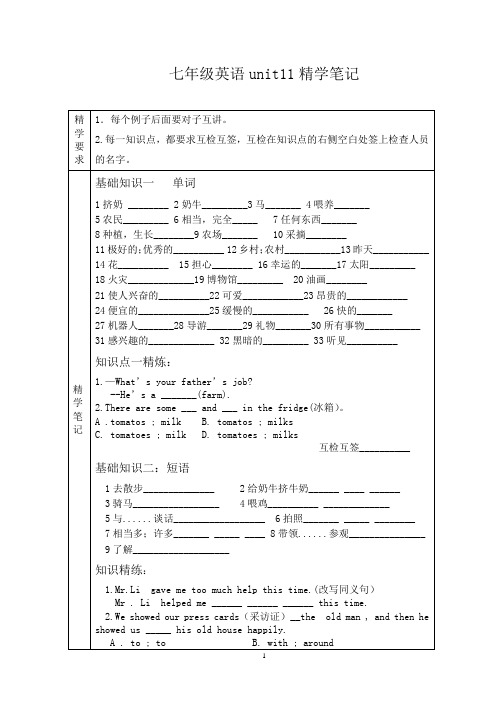
11.种植草莓_________________12.采草莓___________________13.在乡下___________________14.去钓鱼________________
15.在晚上__________________16.许多;大量________________
7相当多;许多_______ _____ ____8带领......参观_______________
9了解___________________
知识精练:
1.Mr.Li gave me too much help this time.(改写同义句)
Mr . Li helped me ______ ______ ______ this time.
2.He _____ last weekend .
A.went fish B. goes fish
C. goes fishingD. went fishing
19.沿着这条路________________
20.之后______________21.为某人买某_________________
22.总的来说__________________23.乘火车______________________
______________给奶牛挤奶_______________喂鸡
21使人兴奋的__________22可爱____________23昂贵的____________
24便宜的______________25缓慢的___________26快的_______
27机器人_______28导游_______29礼物_______30所有事物___________
人教版七年级英语下册 Unit11How was your school trip_重点知识点
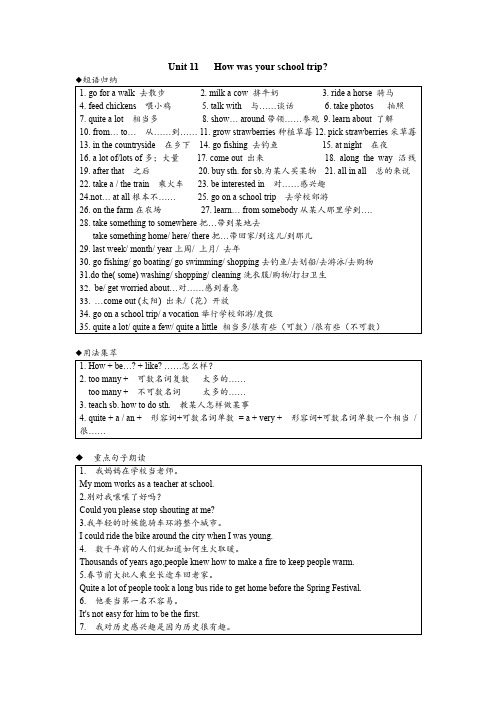
18.乘火车我们很快就到了那儿。
We got there so fast by train.
19.沿途我们看见了些农场和村庄。
We saw some farms and villages along the way.
20.我不知道它们还有本事和我们下棋。
◆用法集萃
1. How + be…? + like? ……怎么样?
2. too many +可数名词复数太多的……
too many +不可数名词太多的……
3. teach sb. how to do sth.教某人怎样做某事
4. quite + a / an +形容词+可数名词单数= a + very +形容词+可数名词单数一个相当/很……
4.数千年前的人们就知道如何生火取暖。
Thousands of years ago,people knew how to make a fire to keep people warm.
5.春节前大批人乘坐长途车回老家。
Quite a lot of people took a long bus ride to get home before the Spring Festival.
22. take a / the train乘火车23. be interested in对……感兴趣
24.not… at all根本不……25. go on a school trip去学校郊游
26.on the farm在农场27. learn… from somebody从某人那里学到….
28. take something to somewhere把…带到某地去
人教版七年级下册英语 Unit 11 基础知识单词、短语、句子默写版

Unit 11 How was your school trip? A部分重点单词★根据汉语提示默写出下列单词1.挤奶v.2.奶牛n.3.马n.4.喂养;饲养v.5.农民;农场主n.6.相当;完全adv.7.任何东西;任何pron.8.种植;生长;发育v.9.农场n. 务农;种田v.10.采;摘v.11.极好的;优秀的adj.12.乡村;农村n. 13.昨天adv.14.花n.15.担心;担忧v.&n.16.幸运地;好运地adv.17.太阳n.★写出下列单词变形1.come⎼______________(过去式)2.get⎼______________(过去式)3.do⎼______________(过去式)4.grow⎼______________(过去式)5.eat⎼______________(过去式)6.feed⎼______________(过去式)7.ride⎼______________(过去式)8.farm⎼______________ /______________(名词)9.is/am⎼______________(过去式)10.worry⎼______________(过去式)11.take⎼______________(过去式)12.see⎼______________(过去式)13.have⎼______________(过去式)14.buy⎼______________(过去式)15.go⎼______________(过去式)16.lucky⎼______________(副词)17.are⎼______________(过去式)重点短词★根据汉语提示默写出下列短语1.给奶牛挤奶2.在乡下;在农村3.骑马4.和某人交谈5.问某人问题6.种植苹果7.从…到…8.看望某人9.吃某人的午饭10.(太阳、月亮或星星)出现11.许多12.去散步13.喂鸡14.拍照15.带领某人参观…16.学习…有关…17.摘草莓18.去钓鱼19.在树下重点句子★根据汉语提示默写出下列句子1.—上周你的旅行怎么样?—棒极了。
人教版七年级下册英语Unit11知识点

人教版七年级下册英语Unit11知识点一, 重点词组
go for a walk 散步
ride a horse 骑马
feed chickens 喂鸡
talk with ... 和...谈话
take some photos 拍照片
at night 在夜间
climb a mountain 爬山
draw pictures 画画
be interested in .... 对...感兴趣
not ..... at all 一点都不
二,重点句子
1,How was your school trip ? 你的旅行怎样?
It was great. 好极了.
2,Did he draw pictures? 他画画了吗?
Yes, he did . 是的他画画了.
3, Did she feed chickens? 她喂鸡了吗?
No, she didn't. She milked a cow. 不,没有. 她挤奶了. 4, Was you at home yesterday? 昨天你在家吗?
Yes, I was. 是的,我在家.
5, Were the countrysides good ? 农村很好吗?
No,they weren't. 不,不好.
三,重点语法
一般过去时态:
一般过去时态表示过去某一时间已经完成的动作或状态. 1, 肯定句: 主语十动词的过去式十其它.
2, 否定句: 主语十wasn't(weren't)十其它.
主语十didn't十动词原形十其它.
3, 一般疑问句: Was (were) 十主语十其它?
Did 十主语十动词原形十其它?。
人教版英语七年级下Unit11单词、知识梳理、词汇句式精讲

人教版英语七年级下Unit11单词、知识梳理、词汇句式精讲Unit11 单词(音标)milk [mɪlk] v. 挤奶cow [kaʊ] n. 奶牛,母牛;母兽milk a cow给奶牛挤奶horse [hɔː(r)s] n. 马ride a horse骑马feed [fiːd] v.(fed/fed)喂养;饲养feed chickens喂鸡farmer ['fɑː(r)mə(r)] n.农民;农场主quite [kwaɪt] adv.相当;完全quitea lot(of…)许多anything ['enɪθɪŋ](常用于否定句或疑问句)任何东西;任何事物grow [grəʊ] v.种植;生长;发育farm [fɑː(r)m] n.农场v.务农pick [pɪk] v.采;摘excellent ['eksələnt] adj.countryside ['kʌntrɪsaɪd].乡村;农村inthe countryside在乡下;在农村yesterday ['jestə(r)dei] adv.昨天flower ['flaʊə(r)] n.花worry ['wʌri] v.&n.担心;担忧luckily ['lʌkɪli] adv.幸运的;好运的sun [sʌn] n.太阳museum [mjuː'ziəm] n.博物馆fire ['faɪə(r)] n.火;火灾frie station ['steɪʃ(ə)n]消防站painting ['peɪntɪŋ] n.油画;绘画exciting [ɪk'saɪtɪŋ] adj.使人兴奋的;令人激动的lovely ['lʌvli] adj.可爱的expensive [ɪk'spensɪv] adj.昂贵的cheap [tʃiːp] adj.廉价的;便宜的slow [sləʊ] adj.缓慢的;迟缓的fast [fɑːst] adv.&adj. 快地(的)robot ['rəʊbɒt] n.机器人guide [gaɪd] n.导游;向导gift [gɪft] n.礼物;赠品all in all总的来说everything ['evrɪθɪŋ] pron.所有事物;一切interested ['ɪntrəɪstɪd] adj.感兴趣的be interested in…对……感兴趣dark [dɑː(r)k] adj.黑暗的;昏暗的hear [hɪə] v.(heard/hɝ:(r)d)听到;听见Carol ['kærəl]卡罗尔(女名)Unit11 知识梳理【重点短语】1. school trip 学校旅行2. go for a walk 去散步3. milk a cow 挤牛奶4. ride a horse 骑马5. feed chickens 喂鸡6. talk with a farmer 与农民交谈7. take some photos 照相8. ask some questions 问一些问题9. grow apples 种苹果10. show sb. around sp. 带某人逛某地11. learn a lot 学到许多12. pick some strawberries 摘草莓13. last week 上周14.In the countryside 在乡村15. visit my grandparents 拜访我的祖父母16. go fishing 去钓鱼17. sound good 听起来很好18. climb the mountains 去爬山19. play some games 玩一些游戏20. visit a museum 参观博物馆21. visit a fire station 参观消防站22.draw pictures 画画23. go on a school trip 去旅行24 visit the science museum 参观科技博物馆25. how to make a model robot 如何制作机器人模型26. gift shop 礼品店27. buy sth. for sb. =buy sb. sth.为某人买某物28. all in all 总得来说29. be interested in... 对…感兴趣30. be expensive 昂贵的31. not...at all 一点儿也不【重点句型】1.---Did you see any cows? 你见到奶牛了吗---Yes, I did. I saw quite a lot. 我见到了而且见到了很多很多2. ---Did Carol take any photos? 罗尔拍照片了吗?---Yes, she did.是的,她拍了。
人教版七年级英语下册Unit11知识点归纳_2
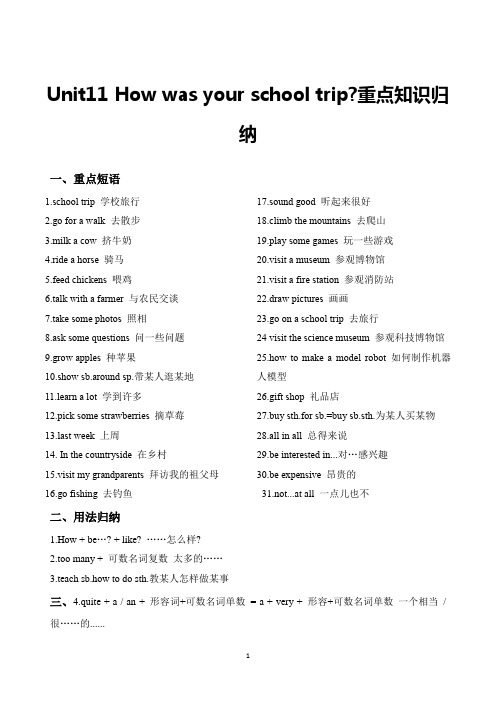
Unit11 How was your school trip?重点知识归纳一、重点短语1.school trip 学校旅行2.go for a walk 去散步k a cow 挤牛奶4.ride a horse 骑马5.feed chickens 喂鸡6.talk with a farmer 与农民交谈7.take some photos 照相8.ask some questions 问一些问题9.grow apples 种苹果10.show sb.around sp.带某人逛某地11.learn a lot 学到许多12.pick some strawberries 摘草莓st week 上周14. In the countryside 在乡村15.visit my grandparents 拜访我的祖父母16.go fishing 去钓鱼17.sound good 听起来很好18.climb the mountains 去爬山19.play some games 玩一些游戏20.visit a museum 参观博物馆21.visit a fire station 参观消防站22.draw pictures 画画23.go on a school trip 去旅行24 visit the science museum 参观科技博物馆25.how to make a model robot 如何制作机器人模型26.gift shop 礼品店27.buy sth.for sb.=buy sb.sth.为某人买某物28.all in all 总得来说29.be interested in...对…感兴趣30.be expensive 昂贵的31.not...at all 一点儿也不二、用法归纳1.How + be…? + like? ……怎么样?2.too many + 可数名词复数太多的……3.teach sb.how to do sth.教某人怎样做某事三、4.quite + a / an + 形容词+可数名词单数= a + very + 形容+可数名词单数一个相当/ 很……的......四、重点句子1.—How was your school trip? 你的学校郊游怎么样?—It was great! 好极了!2.—Did you go to the zoo? 你去动物园了吗?—No, I didn’t.I went to a farm.不, 没有。
人教版七年级下册英语Unit11知识点

WORD格式
2、feed 喂养;饲养
Canyouhelpmefeedmydog?你能帮我喂狗吗?
(1)feed ??to ??
把??喂给 ??
Youcanfeednutstothemonkey. 你可以把坚果喂给这个猴子吃。
(2)feed ??(on)??
用 ??喂 ??
Youcanfeedthemonkey(on)nuts. 你可以用坚果喂猴子。 (3)feedon 以??为食;以 ??为生
6、go+V- 类型短语 ing
gofishi 去钓鱼 ng
goshoppin 去购物 g
goswimmin 去游泳 g
7 、 somuch+ 不可数名 词
gocampin 去野营 g goskati 去滑冰 ng goskii 去滑雪 ng 如此多 ??
可数名词
gohiki 去远足 ng
专业资料整理
(luck )itdidn't.
8. Myfather 9. LastweekI
( grow) someflowersfiveyearsago.
(ride ) ahorseinthepark.
10. Itwasan
(excite )day.
11. Thehouseis 12. Whyareyouso
4、grow 种植;生长;发育 ( 1)种植: Wegrowsomestrawberriesintheyard. 我们在院子里种了些草莓。
( 2)生长;发育: Inspring,everythingbeginstogrow. 春天万物复苏。
( 3)growup 长大;成长: Whenhegrowsup,hewantstobeawriter. 当他长大,他想成为一名作家。
- 1、下载文档前请自行甄别文档内容的完整性,平台不提供额外的编辑、内容补充、找答案等附加服务。
- 2、"仅部分预览"的文档,不可在线预览部分如存在完整性等问题,可反馈申请退款(可完整预览的文档不适用该条件!)。
- 3、如文档侵犯您的权益,请联系客服反馈,我们会尽快为您处理(人工客服工作时间:9:00-18:30)。
Unit11 名词:cow 奶牛horse 马farmer 农民countryside 乡村;农村flower 花sun 太阳museum 博物馆fire 火;火灾painting 油画;绘画robot 机器人guide 导游;向导gift 礼物;赠品动词:milk 挤奶feed 喂养;饲养pick 采;摘hear 听到;听见grow 种植;生长;发育形容词:lovely 可爱的expensive 昂贵的cheap 廉价的;便宜的slow 缓慢的;迟缓的interested 感兴趣的dark 黑暗的;昏暗的excellent 极好的;优秀的exciting 使人兴奋动物;令人激动的副词:quite 相当;完全yesterday 昨天luckily 幸运地;好运地代词:anything 任何东西;任何事物everything 所有事物;一切兼类词:farm n农场v务农;种田worry v&n担心;担忧fast adv&adj 快地(的)短语:milk a cow 给奶牛挤奶ride a horse 骑马feed chicken 喂鸡quite a lot(of……)许多in the countryside 在乡下;在农村fire station 消防站all in all 总的说来be interested in 对……感兴趣go for a walk = take a walk 去散步go on a trip = have a trip 参加旅行in the dark 在黑暗中come out(太阳、星星、月亮)出现;露出;出版知识点:1、milk 牛奶(名词)→milk挤奶(动词)rain雨(名词)→rain下雨(动词)water水(名词)→water浇水(动词)plant植物(名词)→plant种植(动词)2、feed喂养;饲养Can you help me feed my dog?你能帮我喂狗吗?(1)feed……to……把……喂给……You can feed nuts to the monkey. 你可以把坚果喂给这个猴子吃。
(2)feed……(on)……用……喂……You can feed the monkey(on)nuts. 你可以用坚果喂猴子。
(3)feed on 以……为食;以……为生Cows feed on grass. 奶牛以草为食。
3、不定代词:(1)做主语时谓语动词用单数(2)形容词修饰时放在后面①something 某物;某事用于肯定句Something is different. 一些事不同了。
②anything 任何东西;任何事物用于否定句和疑问句Is there anything special in the room?房间里有什么特别的东西吗?③everything 所有事物;一切Everything is OK. 一切都很好。
4、grow 种植;生长;发育(1)种植:We grow some strawberries in the yard. 我们在院子里种了些草莓。
(2)生长;发育:In spring, everything begins to grow. 春天万物复苏。
(3)grow up长大;成长:When he grows up, he wants to be a writer. 当他长大,他想成为一名作家。
5、learn……about 学习/了解/知道……的知识learn from sb 向……学习I'd like to learn something about British history. 我想了解有关英国历史的知识。
He is hard-working. We should learn from him. 他很努力,我们应该向他学习。
6、go + V-ing类型短语go fishing 去钓鱼go shopping 去购物go swimming 去游泳go camping 去野营go skating 去滑冰go skiing 去滑雪go hiking 去远足7、so much + 不可数名词如此多……so many + 可数名词如此多……There is so much water. 这有如此多的水。
We have so many friends here. 我们在这里有如此多的朋友。
8、worry about sb/sth = be worried about担心某人/某事She worries about Jim. = She is worried about Jim. 她担心Jim。
9、on fire 着火make/build a fire 生火put out a fire 灭火The tree is on fire. 这棵树着火了。
10、excited 感到兴奋的修饰人exciting 使人兴奋的;令人激动的修饰物He is excited. 他很兴奋。
The movie is exciting. 这部电影很令人兴奋。
11、go on a trip = have a trip 去旅行go on a trip with sb 和某人一起去旅行go on a trip to + 地点去某地旅行Do you want to go/have on a trip?你想去旅行吗?Do you want to go on a trip with me?你想和我一起去旅行吗?Do you want to go on a trip to London?你想去伦敦旅行吗?12、be interested in sth对……感兴趣be interested in doing sth对做某事感兴趣Tom is interested in basketball. Tom对篮球感兴趣。
Lisa is interested in singing and dancing. Lisa对唱歌跳舞感兴趣。
13、interested 感兴趣的修饰人interesting 有趣的修饰物He is interested in music. 他对音乐感兴趣。
The mivie is interesting. 这部电影很有趣。
14、hear sb doing sth 听到某人正在做某事hear sb do sth 听见某人你做了某事/经常做某事I hear Tina singing in the classroom. 我听见Tina 正在教室唱歌。
I often hear Tina sing in the classroom. 我经常听见Tina在教室唱歌。
15、not……at all一点儿也不Tim doesn't like dancing at all. Tim一点也不喜欢跳舞。
I don't like this book at all. 我一点也不喜欢这本书。
16、一般过去时知识点见具体讲义1.The T-shirt is too e . Please give me the c one.2.Do you like living in the city or the c ?3.There are some f in the garden. They are so beautiful.4.It is very d in the room. I can't see anything.5.Didn't you h what I said?6.My uncle is a (farm).7.We worried it would rain on the way but (luck)it didn't.8.My father (grow)some flowers five years ago.st week I (ride)a horse in the park.10.It was an (excite)day.11.The house is (着火).12.Why are you so (慢)?Hurry up!13.The (导游)explains the history of the Great Wall.14. a lot of students don't like speaking English after class.15.They (去旅行)yesterday.16.—Are you (interest)in making model robots?—Yes, It's so(interest).17.I didn't (学习)robots.18.(总的说来), our trip was great.19.I don't like the novel (一点儿也不).20.Would you like (散步)?21.Frank (挤奶)a cow every day.22.Mary helps me (喂)my cat.23.Look!They (摘)apples.24.My grandfather (去钓鱼)every Sunday.25.I cleaned my room (昨天).26.Don't (担心)me.27.The rain stopped and the sun (出现).28.I often hear the girl (practice)the piano in this room.。
